
Stephanie T. Chung, M.B.B.S.
National Institute of Diabetes and Digestive and Kidney Diseases (NIDDK)
Dr. Stephanie T. Chung was born and raised in Kingston, Jamaica. She obtained her undergraduate degree in Biology from Knox College, Galesburg, IL, and received her M.B.B.S. (Hons) from the University of the West Indies Medical School. She is a board-certified physician in internal medicine, pediatrics, and pediatric endocrinology, having completed her residency training at the University of Texas Medical Branch in Galveston, and her fellowship training at the Baylor College of Medicine. She joined the NIH in 2013 as an Assistant Clinical Investigator and became Co-Director of the Metabolic Research Program in NIDDK in 2018. She is now a Lasker Clinical Research Scholar and tenure-track investigator whose combined clinical and research goals are to reduce diabetes health disparities across the lifespan by improving diabetes risk stratification and management, especially in youth and young adults from underrepresented minority populations.

Megan Clarke, Ph.D.
National Cancer Institute, Division of Cancer Epidemiology and Genetics (NCI DCEG)
Dr. Megan Clarke grew up in Northern New Jersey and received her bachelor’s degree in Behavioral Biology at the Johns Hopkins University. She earned a Master of Health Science in biochemistry and molecular biology and completed her Ph.D. in epidemiology, both from the Johns Hopkins Bloomberg School of Public Health. She conducted her postdoctoral work as an NCI Cancer Prevention Fellow in NCI DCEG’s Clinical Genetics Branch, where she is now a Stadtman tenure-track investigator. Her research focuses on the etiology, prevention, risk prediction, and early detection of anogenital and endometrial cancers, with a particular focus on disparities in diverse populations.

Allana T. Forde, Ph.D.
National Institute on Minority Health and Health Disparities (NIMHD)
Dr. Allana T. Forde was born in Queens, New York to immigrants from Guyana. She received her B.A. in Child Development and Community Health from Tufts University, M.P.H. in Epidemiology from George Washington University, and Ph.D. in Epidemiology from Columbia University. She was a postdoctoral research fellow at the Urban Health Collaborative at Drexel University and is now a Stadtman tenure-track investigator at NIMHD. Her research focuses on the stressors that are more frequently experienced by racial and ethnic minority populations and the impact that these stressors have on health disparities and the cardiovascular health of African American, Afro-Caribbean and Afro-Latinx populations.

Luis M. Franco, M.D.
National Institute of Arthritis and Musculoskeletal and Skin Diseases (NIAMS)
Dr. Luis M. Franco was born in Colombia and grew up in Brazil, Mexico, the United States, and Colombia. He received his M.D. from the Pontificia Universidad Javeriana in Bogotá, followed by a residency in internal medicine and a fellowship in clinical genetics at Baylor College of Medicine (BCM). He was a junior faculty member at BCM before being accepted to the Transition Program in Clinical Research at NIAID in 2014. He is now a Stadtman tenure-track investigator in the Systemic Autoimmunity Branch at NIAMS, with a joint appointment at NIAID. His laboratory applies functional genomics approaches to the solution of medically important questions related to the immune system. A major area of research involves the molecular dissection of the genomic effects of glucocorticoids, a class of drugs that has been used to treat autoimmune, inflammatory, and neoplastic diseases for 70 years but remains poorly understood.
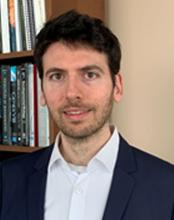
Thomas Gonatopoulos-Pournatzis, Ph.D.
National Cancer Institute, Center for Cancer Research (NCI CCR)
Dr. Thomas Gonatopoulos-Pournatzis was born and raised in Athens, Greece. He received his bachelor’s degree in Biology from the National & Kapodistrian University of Athens, his master’s degree from King’s College London, and his Ph.D. at the University of Dundee, Scotland. After a postdoctoral fellowship at the University of Toronto in 2020, he joined the RNA Biology Laboratory at NCI CCR as a Stadtman tenure-track investigator to establish the Functional Transcriptomics Section which integrates functional genomics and RNA biology. His lab combines the development and application of CRISPR tools with high-throughput phenotyping to identify genetic elements and segments that play critical roles in normal physiology and the disease state.

Yogen Kanthi, MD
National Heart, Lung, and Blood Institute (NHLBI)
Dr. Yogen Kanthi grew up in Cincinnati, Ohio and in India. He obtained a bachelor’s degree at Xavier University and medical degree at Ohio State University. He completed internship, residency and chief medical residency at University Hospitals of Cleveland Case Western Medical Center, followed by dedicated clinical fellowships in cardiovascular and vascular medicine. He did a post-doctoral fellowship before becoming an Assistant Professor at the University of Michigan Medical School where his lab discovered new links between inflammation and blood coagulation. He is now a Lasker Clinical Research Scholar and tenure-track investigator at NHLBI in the Translational Vascular Medicine Branch. His long-term goal as a physician-scientist is to identify the causes of venous thrombosis and inflammation in order to develop new treatments for highly morbid venous diseases that affect millions of people each year.
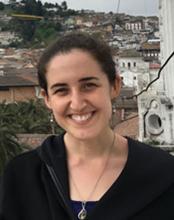
Leah Katzelnick, Ph.D.
National Institute of Allergy and Infectious Diseases (NIAID)
Dr. Leah Katzelnick grew up in Madison, Wisconsin. She conducted her doctoral research on antigenic variation among dengue viruses at the University of Cambridge and the National Institutes of Health as an NIH OxCam Scholar. After finishing her PhD in 2016, she conducted postdoctoral work at UC Berkeley and University of Florida on determinants of dengue and Zika disease, spending a year in Ecuador and Nicaragua to work closely with the research teams conducting longitudinal cohort studies. As of 2020, she is a Stadtman tenure-track investigator and Chief of the Viral Epidemiology and Immunity Unit in the Laboratory of Infectious Diseases at NIAID. This new unit will use a multidisciplinary approach to investigate immunological protection against and susceptibility to emerging and reemerging viral diseases with the goal of informing how vaccines can be effectively and safely licensed and introduced through vaccination programs.

Erikka Loftfield, Ph.D.
National Cancer Institute, Division of Cancer Epidemiology & Genetics (NCI DCEG)
Dr. Erikka Loftfield grew up in Falmouth, Massachusetts. She earned a B.A. in Biological Sciences from Cornell University and an M.P.H. and a Ph.D. in Chronic Disease Epidemiology from Yale University. She has been at NCI DCEG since 2013, first as a pre-doctoral fellow through the Yale University-NCI Partnership Training Program and then as a postdoctoral fellow in the Metabolic Epidemiology Branch, where she is now a Stadtman tenure-track investigator. Currently, she investigates the interplay between diet, metabolism, the microbiome and genetics and their effects on gastrointestinal cancer and health. She is developing an integrative research program that leverages emerging technologies to advance nutritional research to clarify diet-cancer associations and their underlying mechanisms.
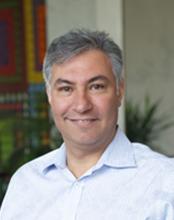
Leonardo Mariño-Ramírez, Ph.D.
National Institute on Minority Health and Health Disparities (NIMHD)
Dr. Leonardo Mariño-Ramírez received a B.S. in Microbiology from Universidad de Los Andes, Bogotá, Colombia, and a Ph.D. in Biochemistry from Texas A&M University. Prior to his current position as a Stadtman tenure-track investigator at NIMHD, he was a staff scientist at NIH’s National Library of Medicine, National Center for Biotechnology Information. He is an adjunct professor in the Graduate Program in Bioinformatics at Boston University and at Johns Hopkins University. He uses integrative approaches to solve complex and challenging biological problems that are focused on reducing health disparities in underrepresented populations of the United States. His research focuses on the combined analysis of genetic ancestry and electronic health records in large biobank cohorts to discover and map disease genes and their variants.

Ian Myles, M.D.
National Institute of Allergy and Infectious Diseases (NIAID)
Dr. Ian Myles was born and raised in Colorado. He has a B.S. in Biology from Colorado State University, an M.P.H. from George Washington University, and an M.D. from the University of Colorado. He completed an internal medicine residency at The Ohio State University and a fellowship in allergy and clinical immunology at NIAID before becoming an Assistant Clinical Investigator there. He is also a commissioned officer in the United States Public Health Service Commissioned Corps. Now a Lasker Clinical Research Scholar and tenure-track investigator, he heads the Epithelial Therapeutics Unit studying how human health is affected by the skin microbiome and how the skin microbiome is impacted by environmental exposures (such as chemical use or dietary choices). His specific focus is on eczema (also called atopic dermatitis), an inflammatory skin disease associated with reduced quality of life and high risk of developing asthma, allergic rhinitis, and food allergies.
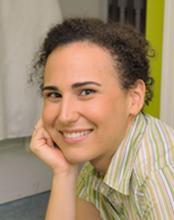
Lauren Porter, Ph.D.
National Library of Medicine (NLM)
Dr. Lauren Porter was born and raised in Baltimore, MD. She received B.S. degrees in physics and mathematics from the University of Maryland, Baltimore County, and a Ph.D. in molecular biophysics at Johns Hopkins University. With a Ruth L. Kirschstein National Research Service Award, she conducted postdoctoral research on engineering proteins that switch folds at the University of Maryland’s Institute for Bioscience and Biotechnology Research. She was a research scientist at Howard Hughes Medical Institute, Janelia Research Campus, before becoming a Stadtman tenure-track investigator at NLM with a joint appointment at NHLBI. The Porter lab’s research focuses on fold-switching proteins, which dramatically remodel their structures and change their functions in response to cellular stimuli. A better understanding of how these proteins change their structures and functions could lead to improved treatments for their associated diseases, including cancer, Alzheimer’s, autoimmune dysfunction, and bacterial infection.

Tais Berelli Saito, D.V.M., Ph.D.
National Institute of Allergy and Infectious Diseases (NIAID)
Dr. Tais Saito was born and raised in Southeast Brazil. She received her D.V.M. and a master’s degree in Infectious Diseases at the State University of Londrina-PR, Brazil, where she also completed a residency in clinical medicine and surgery of companion animals, as well as a Ph.D. in Veterinary Medicine and Infectious Diseases at the University of Sao Paulo, Brazil. She did postdoctoral training and eventually became a Research Assistant Professor at the University of Texas Medical Branch in Galveston. She is now a tenure-track investigator at NIAID’s Rocky Mountain Laboratories in Hamilton, Montana, where her research focuses on the cutaneous interface of vector-host-pathogen interaction, with an emphasis on the role of skin immune responses in the pathogenesis of disease severity and/or the development of protective immunity.

Joshua Tan, Ph.D.
National Institute of Allergy and Infectious Diseases (NIAID)
Dr. Joshua Tan was born and raised in Kuala Lumpur, Malaysia. He obtained his bachelor’s degree from Monash University and completed his DPhil (Ph.D.) at the University of Oxford, England, with a large part of his project conducted at the Institute for Research in Biomedicine in Bellinzona, Switzerland and the KEMRI-Wellcome Trust Research Programme in Kilifi, Kenya. He is now a Stadtman tenure-track investigator at NIAID, where his research focuses on understanding naturally acquired immunity to pathogens through the high-throughput isolation and characterization of human monoclonal antibodies. His current work focuses on Plasmodium falciparum, which causes malaria, and SARS-CoV-2, which causes COVID-19.
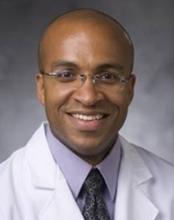
Jason Watts, M.D., Ph.D.
National Institute of Environmental Health Sciences (NIEHS)
Dr. Jason Watts was born in Detroit, Michigan and grew up in Maryland and New York. He received his bachelor’s degree in Biology and Folklore from the University of Pennsylvania, where he also earned his M.D. and Ph.D. at the Perelman School of Medicine. He completed his residency in Internal Medicine at Duke University, and a fellowship in Nephrology at the University of Michigan. He then moved to NIEHS where he is a Stadtman tenure-track investigator in the Epigenetics and Stem Cell Biology Laboratory. His work focuses on understanding the mechanisms by which nucleic acid sequences and structures regulate RNA polymerase pausing, and how transcriptional regulation is coupled to renal physiology.

